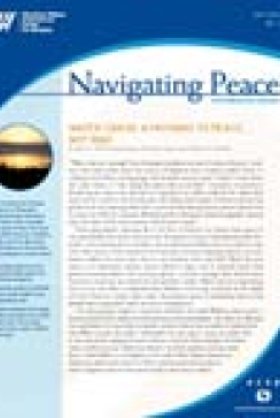Water Can Be a Pathway to Peace, Not War (No. 1)
Posted date/time:

Environmental Change and Security Program

Instances of cooperation between riparian nations outnumbered conflicts by more than two to one between 1945 and 1999. Why? Because water is so important, nations cannot afford to fight over it. Instead, water fuels greater interdependence. By coming together to jointly manage their shared water resources, countries can build trust and prevent conflict. Water can be a negotiating tool, too: it can offer a communication lifeline connecting countries in the midst of crisis.
Authors
Aaron Wolf
Professor and Department Chair of Geosciences, Oregon State University
Annika Kramer
Project Manager, Adelphi Research

Alexander Carius
Director, adelphi

Geoffrey D. Dabelko, PhD
Senior Advisor, ECSP; Former Director, ECSP;
Professor and Associate Dean, George V. Voinovich School of Leadership and Public Affairs, Ohio University; Associate Senior Fellow, Environment of Peace Initiative, Stockholm International Peace Research Institute
Schedule interview
Professor and Associate Dean, George V. Voinovich School of Leadership and Public Affairs, Ohio University; Associate Senior Fellow, Environment of Peace Initiative, Stockholm International Peace Research Institute

Environmental Change and Security Program
The Environmental Change and Security Program (ECSP) explores the connections between environmental change, health, and population dynamics and their links to conflict, human insecurity, and foreign policy. Read more

Explore More
Browse Insights & Analysis
L'eau peut etre un chemin vers la paix, et non vers la guerre (No. 1)
Posted date/time:

The Challenges of Groundwater in Southern Africa (No. 2)
Posted date/time:

The New Face of Water Conflict (No. 3)
Posted date/time: